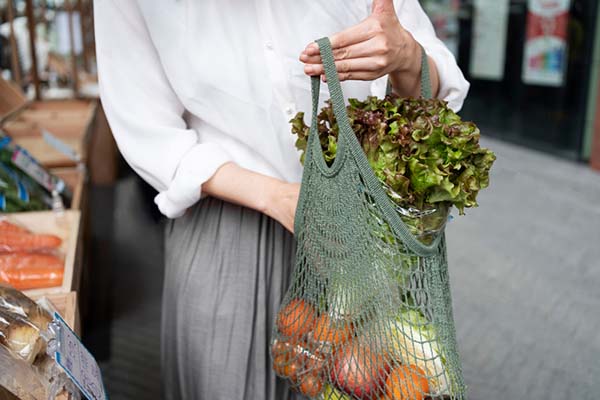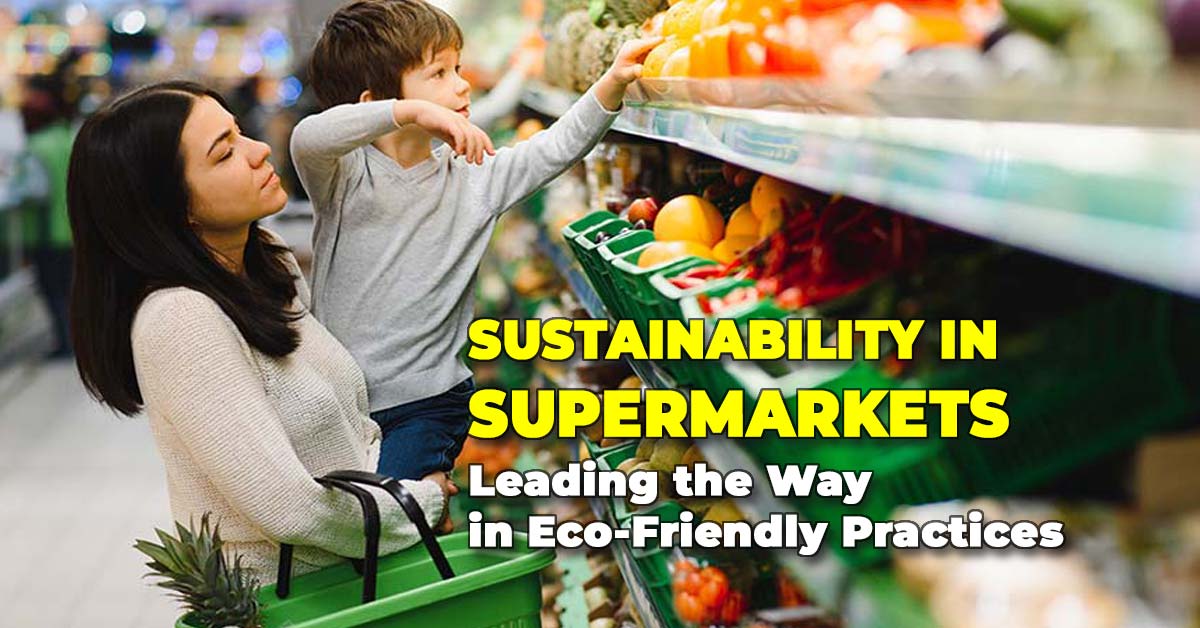In recent years, public concern has grown for the environment and sustainability. As conscious consumers understand the impact on the planet. Businesses are becoming accountable for their practices. One area that has faced scrutiny is the Eco-Friendly Practices of sustainability in supermarkets sector.. Known for its high consumption of resources and production of waste.
Many supermarkets have taken steps towards sustainability. They have become leaders in implementing environmental friendly practices. And you can too! Shopping centre malls continue to play a pivotal role in driving economic growth
In this article, we’ll explore some of the efforts to reduce their carbon footprint. And how supermarkets are leading the way towards a more sustainable future. If you own or work in a supermarket, this article is for you!
Also Read:
- Co-Working Spaces: The New Hotspots for Freelancers and Remote Workers
- Types Of Cloud Services In Everyday Life: Driving Business Growth
- India’s EV Evolution: Seize the Moment with Profitable Business Models
What is a Supermarket?
A supermarket is a large self-service store that offers a wide variety of food, beverages, household products. And sometimes also non-food items. Supermarkets are typically organized into departments, such as produce, dairy, meat, bakery, and frozen foods.

Conscious Customers can browse the aisles, select the items they want, and then proceed to a checkout counter to pay for their purchases. Supermarkets are known for their convenience, as they offer a one-stop shopping experience for consumers.
5 Steps in Eco-Friendly Practices
In today’s environmentally conscious world, it’s crucial for supermarkets to adopt eco-friendly practices. Not only does this help protect the planet, but it also resonates with consumers who are increasingly mindful of sustainability. Here are five steps supermarkets can take to become more eco-friendly:
- Reducing Energy tionConsump: Implement energy-saving measures such as LED lighting and motion sensors in refrigeration units to reduce energy consumption.
- Promote Sustainable Packaging: Offer reusable bags and package-free sections to reduce packaging waste and encourage customers to bring their own containers.
- Partner with Local Suppliers: Source products locally to reduce carbon emissions from transportation and support the local economy.
- Recycling Programs: Implement recycling programs for plastic bags, paper, and other materials, and consider offering incentives for customers to participate.
- Educate Conscious Customers: Share information about environmentally friendly practices and how customers can make a positive impact, through informative displays, workshops, and events.
By taking these steps, supermarkets can lead the way in sustainability and make a positive impact on the environment.
Reducing Energy Consumption
Supermarkets are leading the way in sustainability by reducing energy consumption. This not only helps to decrease their carbon footprint, but it also saves them money on utility bills. Some supermarkets have implemented energy-efficient lighting systems. Such as LED lights, which use less energy than traditional bulbs. Also, many stores have installed motion sensors in their refrigeration units. Ensuring that they are only using energy when the units are being accessed. These minor adjustments can have a significant impact on lowering energy consumption.

If you want to take part in this, it might be a good idea to conduct an energy audit of your store. This involves analyzing your store’s energy usage. Identifying areas of high consumption, and implementing strategies to decrease it. The audit may also make room for upgrading to more energy-efficient equipment. Include ways you can repair existing equipment. By conducting energy audits, sustainability in supermarkets efforts can be improved. And at the same time becoming environmental friendly.
Promoting Sustainable Packaging
Supermarkets have also made efforts to reduce their packaging waste. And promote sustainable packaging options. Many stores now offer reusable bags or encourage conscious consumers to bring their own bags. Some have even introduced package-free sections. Now customers can buy items in bulk using their containers. This not only reduces waste but also allows customers to buy the exact amount of a product they need. Thus reducing food waste as well.

Interested in implementing a bulk purchasing section in your store? There are a few steps you can take. First, research suppliers who offer bulk options for products you already stock. You may also need to invest in dispensers or containers. To make it easy for customers to scoop the desired amount of product. Be sure to label and price each item accurately. And to clean and maintain the dispensers. Make bulk purchasing accessible and convenient for conscious consumers. You can reduce packaging waste and promote sustainability in supermarkets a shopping habits.
Partnering With Local Farms and Suppliers
Attempts are being made for sustainability in Supermarkets by partnering with local farms and suppliers. By sourcing products locally, these stores reduce their carbon footprint. In a way decreasing the distance that products need to travel. This also supports the local economy and promotes a sense of community. Additionally, supermarkets are working with suppliers. To ensure sustainable practices in food production. Such as using organic and non-GMO ingredients.
If you own or work in a supermarket, consider reaching out to local farms and suppliers. This supports sustainability efforts. Also builds relationships within the community. And promotes a sense of transparency for customers. By sourcing locally, you can adopt environmental friendly approach. Support small businesses, and offer fresh and high-quality products to your conscious customers.
You can also work with these suppliers for sustainable practices in food production. And reduce the use of harmful chemicals and pesticides. It’s a win-win situation for everyone involved! Consider reaching out to local farms and suppliers for a more sustainable option.
Implementing Recycling Programs
Recycling has become more prevalent in everyday life, and supermarkets are no exception. Many stores now have recycling programs. In place for plastic bags, paper, and other materials. Some even have composting facilities to reduce food waste. By implementing these programs, supermarkets are not only reducing their waste. But also promoting sustainability in supermarket practices among their customers.

To make a recycling program more engaging for customers. Supermarkets can offer incentives or rewards for participating. For example, conscious customers could receive a discount on their next purchase. When they bring in plastic bags to be recycled at the store. Supermarkets can also educate their customers. On why recycling? And how it helps the environment, encouraging them to take part in the program. Recycling is becoming fun and rewarding. Supermarkets can engage customers and promote a more sustainable mindset.
Educating Customers
By educating their conscious customers sustainability in supermarkets is leading the way. Many stores have informative displays. And signs throughout the store. Sharing information about environmentally friendly practices. And how customers can make a positive impact on the environment.

Some also offer workshops or events focused on sustainability. Such as teaching customers how to compost at home or reduce food waste. By educating their customers, supermarkets are promoting sustainability within their businesses. Eco-friendly practices can create a ripple effect that can extend to the broader community.
Also Read:
- The Goodness Of Plant-Based Lifestyle And Its Spiritual Connection
- What is Gen AI: Decoding The Ultimate Future of Marketing Creativity
FAQ: Eco-Friendly Practices
How can supermarkets reduce their energy consumption?
Supermarkets can reduce energy by using LED lighting and motion sensors in refrigeration units, and by conducting energy audits to identify and address areas of high consumption.
How can supermarkets promote sustainable packaging?
Supermarkets can adopt Eco-Friendly Practices by offering reusable bags, introduce package-free sections, and educate customers about the benefits of using sustainable packaging.
Conclusion
Eco-friendly practices with sustainability in Supermarkets is becoming the buzz word everywhere. And leading the way in environmentally friendly practices. By reducing energy consumption, promoting sustainable packaging, partnering with local suppliers. Implementing recycling programs, and educating their conscious customers.
Supermarkets are making a positive impact on the environment. As consumers become more conscious of their choices. And demand sustainable practices from businesses. Supermarkets need to continue leading the way. And setting an example for others to follow.
Keep shopping green!
Share your Review
Revise and Edit by Editorial Team
Connect with us on our Digital Endeavours-
Transforming Lives… Creating the magic. Just – Believe ~ Practice ~ Perform
BizTech Chronicle… Navigating Tomorrow’s Tech Frontiers 🚀
Youtube – Nuteq Entertainment Pvt Ltd
Trendvisionz – A Premier Digital Marketing Agency in India
Follow me on Twitter or LinkedIn. Check out our website.



